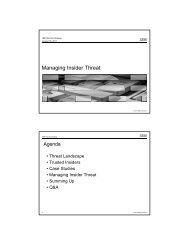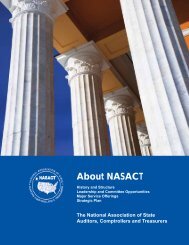Advisory Committee on Tax Exempt and Government Entities (ACT ...
Advisory Committee on Tax Exempt and Government Entities (ACT ...
Advisory Committee on Tax Exempt and Government Entities (ACT ...
Create successful ePaper yourself
Turn your PDF publications into a flip-book with our unique Google optimized e-Paper software.
The Appropriate Role Of The Internal Revenue Service With Respect To <strong>Tax</strong>-<strong>Exempt</strong> Organizati<strong>on</strong> Good Governance Issues• Policies are not practices. Many of the good governance indicators up<strong>on</strong>which the IRS has focused call for policies to be adopted, but do not examinethe practices in which an exempt organizati<strong>on</strong> engages in adhering to thosepolicies, or in otherwise meeting the underlying objectives of the policies.Unless implemented <strong>and</strong> applied in circumstances that warrant thatapplicati<strong>on</strong>, those polices may be no more than pieces of paper left in a filecabinet. One challenge for the IRS in promoting good governance outsidethe boundaries of practices specified in the tax code is in inquiring aboutc<strong>on</strong>duct in ways that will prompt more than self-serving <strong>and</strong> generalaffirmative resp<strong>on</strong>ses.• Bad policies can lead to bad practices. Adopting <strong>and</strong> implementing aparticular policy that promotes more attentive board governance may actuallybe counterproductive if that policy is misguided or even legally defective.Whether that policy correctly reflects IRS <strong>and</strong> state legal requirements is athreshold questi<strong>on</strong>. While raising c<strong>on</strong>sciousness about governance issues byasking about the existence (but not the c<strong>on</strong>tent) of policies may have a valueof its own, it may lead organizati<strong>on</strong>s to check off a box without actuallyimproving their governance, either by adopting flawed policies or by adoptingpolicies that are not effectively implemented. Additi<strong>on</strong>ally, in a world wherethe majority of smaller tax-exempt organizati<strong>on</strong>s simply do not have access toqualified counsel, the right answers may be elusive for them <strong>and</strong> the wr<strong>on</strong>g<strong>on</strong>es may create liability.• The bully pulpit is a form of regulati<strong>on</strong>. The IRS’s ability to shapegovernance behavior informally may be its most flexible tool, but also carriesthe potential for unintended c<strong>on</strong>sequences. In raising c<strong>on</strong>sciousness in thesector through the use of the “bully pulpit” in speeches <strong>and</strong> other forms ofpublic comment, representatives of the IRS should c<strong>on</strong>sider the extraordinarydiversity of the sector, how its message will be received, <strong>and</strong> whether it mayhave any counterproductive effects.• <strong>Exempt</strong> organizati<strong>on</strong>s are governed by boards, not by the IRS. Finally,increasing c<strong>on</strong>cerns about the adequacy of n<strong>on</strong>profit governance <strong>and</strong> thelengthening list of indicators that are advocated as the soluti<strong>on</strong> to thoseproblems may, at some level, serve to undermine the aut<strong>on</strong>omy of n<strong>on</strong>profitboards <strong>and</strong> blunt the critical exercise of their judgment. While mostgovernance indicators are process prescripti<strong>on</strong>s that do not obviouslyencroach up<strong>on</strong> decisi<strong>on</strong>-making, even choices about governance practicesare <strong>and</strong> should be an area for the exercise of business judgment by a board<strong>and</strong> reflect the needs of the specific organizati<strong>on</strong>. Discouraging that exerciseof discreti<strong>on</strong> by prescribing extensive lists of preferred practices may suggestthat boards have no obligati<strong>on</strong> to c<strong>on</strong>sider which policies <strong>and</strong> practices areappropriate for their organizati<strong>on</strong>. Substituting the judgment of the regulatorsundermines board aut<strong>on</strong>omy <strong>and</strong> may discourage board recruitment.ADVISORY COMMITTEE ON TAX EXEMPT AND GOVERNMENT ENTITIES (<strong>ACT</strong>) June 11, 2008 45













